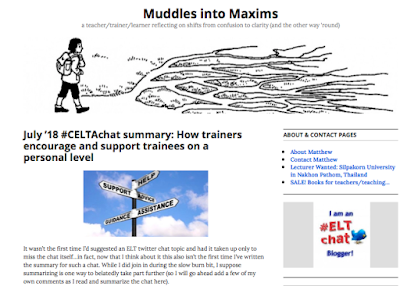Many thanks to Cathy Bowden @Cathyofnusle for volunteering to write this month's summary.
#CELTAchat Summary
Monday 5thNovember 2018
Topic:
Lesson Planning: Do we ask them (candidates) to do more than they
Lesson Planning: Do we ask them (candidates) to do more than they
should?
Participants:
Darren Bell @belllinguist
Angelos Bollas @angelos_bollas
Fiona Price @fionaljp
Giovanni Licata @GioLic1976
Cathy Bowden @Cathyofnusle
MarisaConstantinides @Marisa_C
Breana Sproul @SproulBreana
MariaConca @MConca16
Summary
After some chitchat, Darren Bell kicked off by saying that he might have scared his CELTA candidates on day 1 by having them watch a DVD and then giving them the plan, which he felt was overly detailed. Some agreement that if one’s giving out a full plan of an observed lesson in week 1, it should be made clear that this is not the amount of detail we expect at that stage, but it could be a goal to aim towards. Or if you’re writing a plan as a sample, try to pare it down to the minimum.
Angelos Bollas suggested that we might be being ‘pedantic’ when the candidates write a plan that works for them and the tutor asks for ‘enough detail so that another teacher would be able to use the plan’.
There was some agreement that we should have some tolerance of different ways of writing a plan, Giovanni mentioned he’d had an extreme case where 12 trainees on one course seemed each to have their own way of completing the LP template. Also later, that tutors could be tolerant of non-standard terminology as it’s often getting terminology right in the plan that stresses candidates.
Overall: “we ask a lot but justifiably so” (Marisa C.) was agreed to be a good summary of how we feel about planning.
Specific points:
Anticipated Problems and Solutions–
Angelos had had a trainee say that they didn’t think this was a reasonable expectation for trainees without experience. Cathy Bowden said she told trainees to “prepare for the worst and hope for the best” and to anticipate as much as possible. Some centres put a column in the lesson procedure page for Aps & Ss, so that the candidates can think about potential issues for specific stages and they find that helpful.
Angelos had had a trainee say that they didn’t think this was a reasonable expectation for trainees without experience. Cathy Bowden said she told trainees to “prepare for the worst and hope for the best” and to anticipate as much as possible. Some centres put a column in the lesson procedure page for Aps & Ss, so that the candidates can think about potential issues for specific stages and they find that helpful.
Should candidates be asked for a plan for TP1?
It was mentioned that one course only asks for a plan from TP2, but general reaction was that the earlier the candidates start attempting a plan the better. In some centres the first 2 plans are the procedure sheet only and are commented on but not graded.
Is the level of detail in a plan a criterion for a Pass B or A?
General agreement that thoroughness of language analysis was needed for a higher grade but otherwise the difference is more in the level of independence. Indeed, some candidates could go overboard and give too much detail in the procedure, thinking this will help get a higher grade and produce a plan that is hard to follow.
Course time spent on planning vs input sessions
Fiona Price asked if more time should be given to lesson planning issues and less on input sessions. However, some felt that as there’s not that much time for input anyway, it would be difficult to do. Cathy and Darren suggested that dealing with planning issues may be dealt with best in TP feedback, in the context of an actual lesson. So ensuring there’s enough time to address these issues in TP feedback sessions is important.
Does a full-lesson plan prepare candidates for post-CELTA teaching with a minimal plan?
The response was that having to write down a full plan develop the skill of thinking through the plan, so that they can manage without it written down afterwards.
Have candidates rewrite lesson plans?
Marissa mentioned that on a previous non-CELTA courses, they had candidates teach 4 lessons and rewrite the plans after the lessons. Cautiously welcoming reaction – the issue, as ever!, being the difficulty of finding time for it in the course, and potential extra workload for the candidates. Also if it’s to be marked by the tutors, that’s more work for them, though Marisa suggested for a couple of lessons having the trainees submit only draft plans before the lesson, and amend them afterwards, with the final version being marked.
Centres grading plan separately from the lesson
Darren mentioned that he’d heard some centres do this, some thought it was potentially confusing. Cathy said that they do it, with it being stated separately if the plan and lesson meet the standard, as well as an overall grade for the TP.
Cathy Bowden @Cathyofnusle summarising





